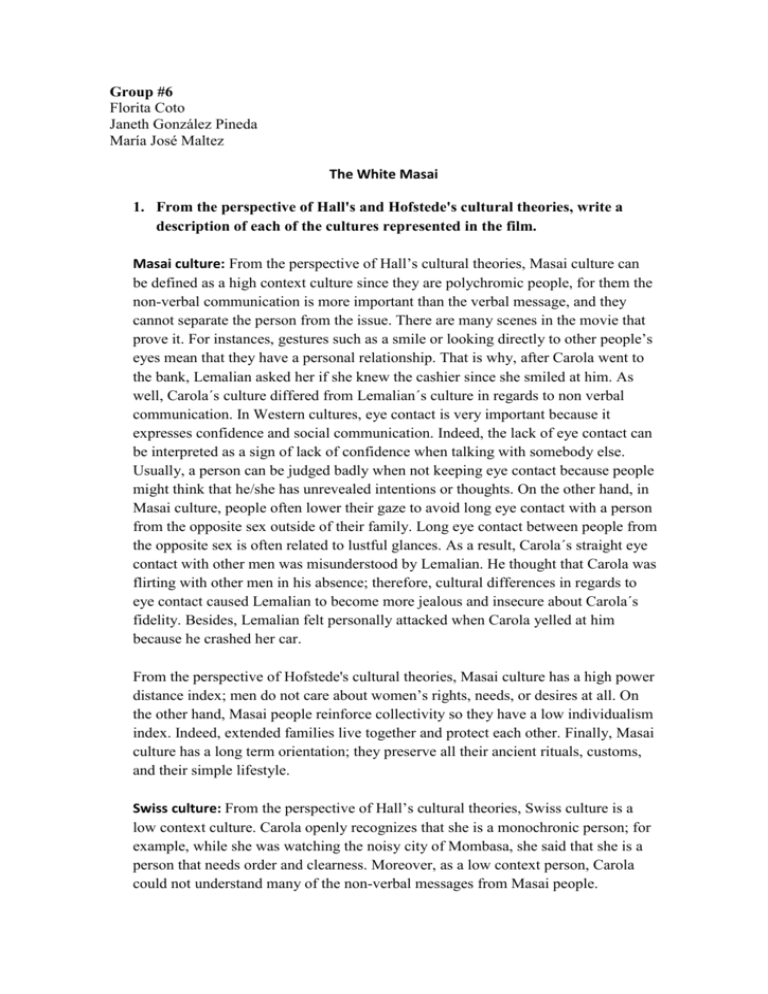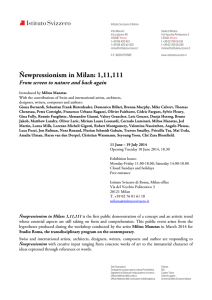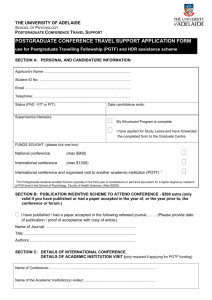The White Masai group 6
advertisement

Group #6 Florita Coto Janeth González Pineda María José Maltez The White Masai 1. From the perspective of Hall's and Hofstede's cultural theories, write a description of each of the cultures represented in the film. Masai culture: From the perspective of Hall’s cultural theories, Masai culture can be defined as a high context culture since they are polychromic people, for them the non-verbal communication is more important than the verbal message, and they cannot separate the person from the issue. There are many scenes in the movie that prove it. For instances, gestures such as a smile or looking directly to other people’s eyes mean that they have a personal relationship. That is why, after Carola went to the bank, Lemalian asked her if she knew the cashier since she smiled at him. As well, Carola´s culture differed from Lemalian´s culture in regards to non verbal communication. In Western cultures, eye contact is very important because it expresses confidence and social communication. Indeed, the lack of eye contact can be interpreted as a sign of lack of confidence when talking with somebody else. Usually, a person can be judged badly when not keeping eye contact because people might think that he/she has unrevealed intentions or thoughts. On the other hand, in Masai culture, people often lower their gaze to avoid long eye contact with a person from the opposite sex outside of their family. Long eye contact between people from the opposite sex is often related to lustful glances. As a result, Carola´s straight eye contact with other men was misunderstood by Lemalian. He thought that Carola was flirting with other men in his absence; therefore, cultural differences in regards to eye contact caused Lemalian to become more jealous and insecure about Carola´s fidelity. Besides, Lemalian felt personally attacked when Carola yelled at him because he crashed her car. From the perspective of Hofstede's cultural theories, Masai culture has a high power distance index; men do not care about women’s rights, needs, or desires at all. On the other hand, Masai people reinforce collectivity so they have a low individualism index. Indeed, extended families live together and protect each other. Finally, Masai culture has a long term orientation; they preserve all their ancient rituals, customs, and their simple lifestyle. Swiss culture: From the perspective of Hall’s cultural theories, Swiss culture is a low context culture. Carola openly recognizes that she is a monochronic person; for example, while she was watching the noisy city of Mombasa, she said that she is a person that needs order and clearness. Moreover, as a low context person, Carola could not understand many of the non-verbal messages from Masai people. From the perspective of Hofstede's cultural theories, Swiss culture has a low power distance index. That is why, Carola could succeed and own a shop. This aspect of Carola’s life also reveals that Swiss culture has a high individualism index. Personal achievements are very important for Swiss people. This is also a society that takes risks; for this reason, Carola do not hesitate; she abandoned her life in Switzerland to be with Lemalian. 2. Describe Carola's process of culture shock and eventual, if any, cultural adaptation. In the name of love Carola tries hard to adapt to Masai culture. However, the complexity of the cultural differences between her and Lemalian was greater and stronger than love. For us, Carola’s process of culture shock is: everything is awfuleverything seems to be ok- everything is awful. Even before Carola and Lemalian relationship began, she was astonished about what Elizabeth said about the conditions in Barsaloi: there is not drinking water, electricity, and people live in huts. In spite of these disadvantages, in one point Carola felt that their cultural differences did not matter. For instance, when they “took a shower” together and when she got malaria and Lemalian took care of her. However, little by little she realized that their relationship was not sustainable, and that she should leave him. 3. Choose three scenes where Carola's and Lemalian's differences seem impossible to resolve. Discuss them in terms of your own cultural biases. Who did you side with as you watched these scenes? Why? What would you have done in the characters' place? Genital mutilation scene: for Carola this is a crime, something beyond all reason, but for Lemalian that is something normal, unquestionable, the right thing to do. From our biased cultural point of view, genital mutilation is a violation of human rights. In western countries, female genital mutilation is considered to be a form of violence against women and girls. In fact, genital mutilation can lead to serious difficulties in urination, menstruation, sexual intercourse and childbirth. Female genital mutilation encourages the oppression of women because it is a means to control women´s sexuality. Women in these types of cultures are not allowed to have sexual desire or pleasure. Women´s main function in these societies is to assure reproduction. Therefore, we shared the same frightened reaction as Carola towards female genital mutilation (FGM). Probably, we have done the same thing if we were in Carola´s place. Carola felt powerless in this scene because everybody else in the tribe considered FGM as part of their cultural activities. On the other hand, young women in Masai culture undergo genital mutilation as a part of an elaborate ritual of rite of passage. This event marks the beginning of the “adulthood” when girls can get married. For Masai people this ceremony is very important as a part of their cultural heritage; during the ceremony women who will be circumcised wear dark clothing, paint their faces with markings, and then cover their faces as a part of the ritual. Lemalian’s jealousy: Lemalian can’t understand how Carola speaks to other men and being faithful to him. For Carola, speaking to other men means nothing beyond being kind. Their cultural differences are reflected in their behavior with other people. In Carola´s culture, it is completely normal the communication between people from different sex. Her non verbal communication as well is misunderstood. She is used to have long eye contact with men because in her culture this is a sign of self confidence. However, in Lemalian´s culture, women are not supposed to keep eye contact with men for too long. This is interpreted as a sign of lust glances in this society. In one scene, the Italian priest warns Carola about this issue in regards to eye contact. Nevertheless, she seems to ignore it. With the time, Lemalian´s jealousy grew greater due to the independence of Carola and cultural differences. At the end of the movie, these differences seem impossible to resolve. That is why, at the end of the movie Carola decides to return to Switzerland with her daughter. Even though Carola loved Lemalian, these cultural differences overwhelmed their relationship. Lemalian’s unacceptance of Carola’s success and power: he just can’t bear the thought that Carola becomes a successful woman. He has been taught that the male figure is the one in power not the female. So, he complains about her having the shop and also winning some sheep to the corrupt chief. Lemalian feels that Carola is taking away his position in the tribe. She shows different traits such as independence that are not seen in Masai women. Masai society is strongly patriarchal; women and men have specific functions in the society. Therefore, girls are responsible for chores such as cooking and milking, skills which they learn from their mothers at an early age. Boys are in charge of hearing livestock. This patriarchal division of chores differed from Swiss culture where men and women have almost the same type of jobs. She was used to be an independent woman; she even owned a store in Switzerland. These cultural differences impaired the effective communication between Lemalian and Carola. 4. Discuss the differences in worldview between Carola and Lemalian. Is there any part of the film in which cultural/spiritual/religious reconciliation seems possible? The role of women is viewed totally different from both cultures. For instance, they had totally different perspectives about women’s position in society. Despite of these evident differences, at some parts of the movie Carola seems to be trying to adapt to Lemalian’s culture, but every attempt ends up either in a discussion with her husband or in her realization that she can’t change the things which she can’t adapt to. At some particular moments in the story, Carola and Lemalian seem to be a couple that is able to overcome difficulties, basically because they seem to be truly in love. Indeed, all of these moments are very emotional and romantic, for example, among these are: their stay at the hotel in Mombasa, the returning of Carola from her country (decided to marry Lemalian in spite of the difficult life that she has already experienced in the village) at their wedding, and when Carola gave birth to the baby. However, the complexity of cultural, spiritual, and religious issues is at the end impossible for them to overcome. 5. What specifically Costa Rican cultural traits would collide strongly with the Masai culture? How would Carola have been different if she had been Costa Rican? A Costa Rican would definitely collide with the strict Masai customs regarding to gender segregation: Women cannot touch men in public, men cannot eat food with women, and women must never laugh with or even look at another man. As Elizabeth said, for Masai people goats are more valuable than women. In this sense, Costa Ricans share Carola’s point of view: women and men should have the same rights and duties. In spite of that, Masai and Costa Rican culture are both high context cultures; for that reason, we think that if Carola would have been a Costa Rican woman, she would have handled the situation about non-verbal communication better. Definitely, she would have been able to understand that from Lemalian’s perspective she could not talk to men without being unfaithful to him, just based on Lemalian’s gestures and indirect questions. 6. Discuss the presence of racism in the film, in all the cultural groups represented. Does the movie make any ideological statement on this matter? In the movie, racism is depicted basically in the way that the Masai members are treated in their country. Masai people are considered as not seen as part of the citizens of Kenya. For instance, in the scene when Carola invites Lemalian and his friends to have a drink in her hotel, the guard does not let them in because they are not “civilians.” The guard discriminates them because of their way of living. Even though Masai are Kenyan citizens, in their society are often victims of discrimination because of their cultural background. They are seen as “savage” because of their primitive lifestyle; their customs and culture are often diminished by other Kenyans. Another example of discrimination is the scene when Lemalian is not allowed to enter the Registration Building because of the way he is dressed. The guard at the Registration Building treats Lemalian very bad just because he is wearing a traditional custom. The guard does not recognize the meaning of the custom and arrow for Masai warriors. The ideology of the movie is portrayed through the discrimination of Kenyans towards the Masai people and its culture. The clashes between two cultures and worldview are shown as a main theme in the movie. 7. Is there anything that you think Carola did wrong? What about Lemalian? Discuss. Both of them thought that their culture was superior to that of the other; Carola considered her culture superior to Lemalian’s who in turn considered his culture superior to Carola’s. Therefore, as they considered their worldview better they try to intrude in each other’s cultural traits. When Carola gets to know the life of this tribe, she thinks that they would live better if they adopt some traits of her worldview; that is one of the reasons why she wanted to establish a shop in the place for example. In addition to that, she reveals this attitude when she tries to stop the practice of the genital mutilation of women and also when she brought them many things from her country that would “enhance” the way in which they do things in the village. On the other hand, Lemalian also wanted Carola to adjust to his culture, and not only him but the entire village expected her to adapt and to behave the way they did. Lemalian expected her to assume her role as the rest of the women there, that is why he didn’t accept that she acquired some sort of power through her management of the shop, and also he didn’t wanted her to talk to other men the way she did, because women weren’t supposed to behave in that way at the village.





